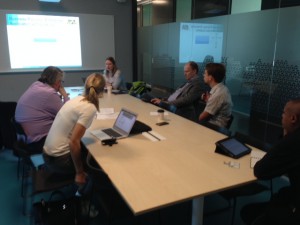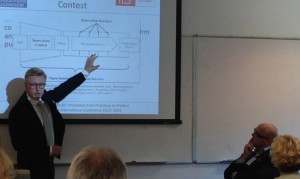Today, me and Anders Hjalmarsson presented the paper “Is the Public Motivated to Engage in Open Data Innovation” at the IFIP EGOV conference at Trinity College in Dublin.
Inese Šūpulniece Thesis Presentation
Today, DSV was visited by Inese Šūpulniece from Riga Technical University who presented her doctoral thesis on Personalization of business process execution in enterprise applications. The presentation was part of the international review process required for Latvian dissertations. The seminar revolved around usability of ERP systems, personalization of business processes and questions related to method and the choices made by Inese. The discussion was very fruitful to us at DSV, we will pick up some ideas in our ERP related courses, and we wish Inese all the best for the defense in October.

From left to right: Joakim Snygg, Elin Uppström, Inese Šūpulniece, Janis Stirna and Martin Henkel.
ECIS Workshop on eGovernment
The eGov-workshop arranged by the AIS special interest group on e-government was held on 8th of June in Tel Aviv at the European Conference of Information Systems. We presented a paper titled: What happens next? – A survey of the afterlife of innovation contests. The paper was presented by Anders Hjalmarsson, Viktoria ICT, Elea Juell-Skielse, DSV and Gustaf Juell-Skielse, DSV. Altogether there were 7 papers presented and 16 participants.
PACIS Track on IT Global Sourcing and Cloud Computing
DSV Center for Service Science and Innovation (SSI) is pleased to invite your research paper submissions for the track “IT Global Sourcing and Cloud Computing” at the Pacific Asia Conference on Information Systems (PACIS) 2011.
Please find out more about the conference track here: IT Global Sourcing and Cloud Computing.
For further inquiries, please contact gjs@dsv.su.se.
Special Issue of JITTA
DSV Center for Service Science and Innovation (SSI) is pleased to invite your research paper submissions for a special issue on “Information Technology Global Services and Sourcing” in the Journal of Information Technology: Theory and Applications, an AIS Journal.
Key Milestones for the Special Issue:
- March 15, 2011: Submission Deadline
- April 15, 2011: First round of reviews and decisions sent to authors
- June 7-8, 2011: Development Workshop at Stockholm University for authors invited to revise; authors are expected to bring a revised version based on first round of reviews
- June 20, 2011: Submission deadline for second round submission
- August 1, 2011: Decisions on second round of review sent to authors
- October 1, 2011: Camera ready papers due
The workshop dates are conveniently set for those interested in attending
ECIS from June 8-9.
Please find more information about the call here: CFP-JITTA.
For further inquiries, please contact gjs@dsv.su.se.
Service Oriented Business Models for Enterprise Resource Planning
Service systems challenge traditional on-premise installations and create opportunities for new business models in the ERP market. In a paper to be presented at BIS2010, me and Håkan Enquist from the Center of Enterprise Systems at Gothenburg School of Business, present six case studies. The case studies are analyzed to identify attributes and patterns of service oriented business models for Enterprise Resource Planning. Two patterns of service oriented business models for ERP are identified: holistic and niche. In addition to analyze business model patterns, we suggest extensions to the Business Model Ontology (Osterwalder) to broaden understanding of service oriented business models for ERP.
The paper is titled: Value Propositions in Service Oriented Business Models for ERP: Case Studies
Seminar on Service Oriented Business Models for Enterprise Systems

An attempt to explain the research approach for the Vinnova project “Service Oriented Business Models for Enterprise Systems”.
On September 30 a seminar was held by me and Håkan Enquist from Gothenburg University to discuss the research being done to identify and evaluate service oriented business models for enterprise systems. Limited studies have been conducted in the past, but now, due to the importance of the SOA phenomenon, the need for such studies has become apparent.
The particpants showed a great interest in the topic and it was a good exercise for us to present and explain what we are up to. The participants were also asked to criticize the research approach and the sometimes lively discussion led to valuable input for the project. The presented approach was challenged by a suggestion to ignore previous research on business models in favour of a more grounded approach. However, these methodological preferences were not shared by all participants and it was also suggested to build on the previous work on value modeling performed by Bergholtz, Johannesson et al. Maybe these models could be evaluated as part of the ongoing research.
All in all, me and Håkan feel that the research approach stood the test so far but that we got some valuable feedback on how to proceed and to problematize on the subject.
Thank you all for participating.
Powerpoint slides:
Seminarium 30 september.ppt
